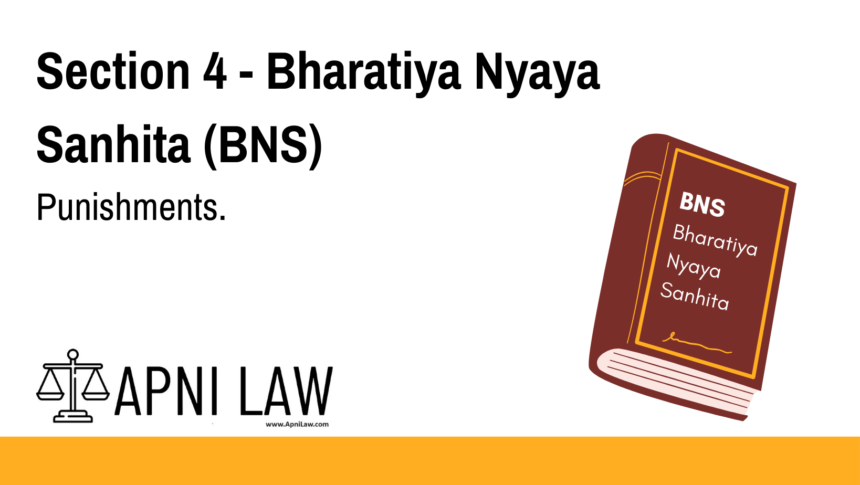Code: Section 4 BNS
Section 4 – Punishments
The punishments to which offenders are liable under the provisions of this Sanhita are—
(a) Death;
(b) Imprisonment for life;
(c) Imprisonment, which is of two descriptions, namely:
(1) Rigorous, that is, with hard labour;
(2) Simple;
(d) Forfeiture of property;
(e) Fine;
(f) Community Service.
Explanation of Section 4 BNS
Section 4 of Bharatiya Nyaya Sanhita (BNS) defines the types of punishments that can be imposed on offenders. This section is a crucial part of criminal law as it specifies the penalties for various offences.
Types of Punishments under Section 4 BNS
- Death Penalty (Capital Punishment)
- Reserved for the most heinous crimes such as murder with extreme brutality, terrorism, and rarest of rare cases.
- Decided by the court based on the gravity of the crime and aggravating circumstances.
- Imprisonment for Life
- The convict remains in prison for the rest of their natural life.
- Courts may impose remission based on good behavior or special circumstances.
- Imprisonment (Two Types)
- Rigorous Imprisonment (With Hard Labour)
- The prisoner is required to perform hard labour (e.g., breaking stones, working in prison industries).
- Generally awarded for serious crimes like robbery, dacoity, or grievous hurt.
- Simple Imprisonment
- The convict is kept in custody without hard labour.
- Usually given for minor offences like defamation, public nuisance, or contempt of court.
- Rigorous Imprisonment (With Hard Labour)
- Forfeiture of Property
- The court may order seizure of the convict’s property if the offence involves illegally acquired assets.
- Common in economic offences, smuggling, and corruption cases.
- Fine
- A monetary penalty imposed on the offender.
- May be imposed alone or along with imprisonment.
- The amount varies depending on the severity of the crime.
- Community Service (New Addition in BNS)
- Introduced to promote rehabilitation instead of imprisonment for minor offences.
- The convict is required to perform unpaid work for the benefit of society (e.g., cleaning public places, assisting NGOs).
- Aims to reduce prison overcrowding and promote reformation of offenders.
Illustration of Section 4 BNS
Example Cases
Case 1: Murder (Punishment – Death or Life Imprisonment)
A commits a brutal murder of multiple people in a pre-planned manner. The court finds it a rarest of rare case and awards the death penalty under Section 4(a) BNS.
Case 2: Theft (Punishment – Rigorous or Simple Imprisonment, Fine)
B is caught stealing from a shop. Since it is a non-violent crime, the court awards simple imprisonment and a fine under Section 4(c) & (e) BNS.
Case 3: Corruption (Punishment – Forfeiture of Property, Imprisonment)
C, a government officer, is found guilty of amassing illegal wealth. The court orders forfeiture of property under Section 4(d) BNS.
Case 4: Minor Public Offence (Punishment – Community Service)
D is found guilty of littering in public places repeatedly. Instead of imposing a fine or imprisonment, the court orders community service, requiring D to clean public parks under Section 4(f) BNS.
Common Questions on Section 4 BNS
1. What is the new addition in Section 4 BNS?
The concept of community service as a punishment is a new addition under Section 4(f) BNS, aiming to reform minor offenders without imprisonment.
2. Is the death penalty still applicable under BNS?
Yes, the death penalty is applicable in rarest of rare cases, such as brutal murders, terrorist activities, and heinous crimes.
3. What is the difference between rigorous and simple imprisonment?
- Rigorous Imprisonment involves hard labour and is given for serious crimes.
- Simple Imprisonment does not require hard labour and is given for minor offences.
4. Can a convict’s property be seized under BNS?
Yes, under Section 4(d) BNS, a court can order forfeiture of property if the crime involves illegally acquired assets or corruption.
5. What are the advantages of community service punishment?
- Helps in reforming offenders rather than imprisoning them.
- Reduces prison overcrowding.
- Encourages social responsibility.
Conclusion
Section 4 of the Bharatiya Nyaya Sanhita (BNS) defines six types of punishments, ensuring that criminal justice is served fairly. While severe crimes attract death or life imprisonment, minor offences may lead to community service, reflecting a shift towards reformation over retribution.
The introduction of community service as a punishment aligns with global progressive legal systems, aiming for a balanced approach between deterrence and rehabilitation.
🔗 Read more about related sections:
- Section 4 BNS – Punishments
- Section 5 BNS – Types of Imprisonment
- Full BNS Bare Act
For more legal updates, visit ApniLaw.com, your trusted legal knowledge source! 🚀











